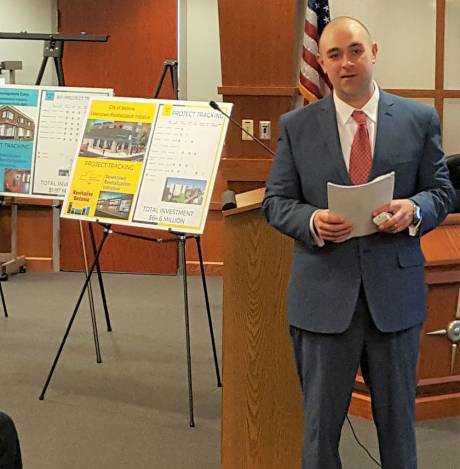
Batavia Development Corporation Executive Director Andrew Maguire borrowed a line often used by his counterpart at the Genesee County Economic Development Corporation on Monday night as he outlined accomplishments and goals of the City-funded agency charged with attracting and facilitating investment.
“Economic development is a marathon, not a sprint,” Maguire said, echoing to a certain extent the message conveyed by Steve Hyde, GCEDC president, in his public addresses.
Maguire, a lifelong Batavian and former clerk-treasurer for the Village of Oakfield, was named to the post on Nov. 18.
He has had to absorb much information in that time as the City of Batavia is in the midst of negotiations to advance several projects that are part of the $10 million Downtown Revitalization Initiative, along with other business-friendly loan and grant programs.
Over the past few years, Batavia has come up with different strategies to spur new development and investment, including remediation of Brownfield Opportunity Area districts, Revolving Loan Fund and Grant programs, New York Main Street Grant program, and the Batavia Pathway to Prosperity Fund PILOT*-- repurposing agreement forged by the five taxing jurisdictions (City of Batavia, Genesee County, Batavia City School District, GCEDC and BDC).
“New development is about what will make Batavia attractive to all entrepreneurs,” Maguire said, adding that the success of these programs can bring about a “Live, Work, Play” lifestyle that young professionals are seeking.
Maguire said the City’s population of 14,396 is projected to decrease considerably over the next 20 years, with about 5,000 less citizens in the 25 to 64 age range. But, he said, that effective economic development could turn things around for a community that has 2.3 million people and 67 colleges within a 60-mile radius.
“HP Hood is set to hire 200 to 250 50 employees, which will double its workforce,” Maguire said, adding that about 75 percent of those who work in the City don’t live in the City.
He also pointed out that the housing situation in Batavia is less than optimal as more than half of housing units are more than 50 years old and “in need of substantial rehabilitation.”
“Industrial growth is outpacing housing (construction),” he said, factors not conducive to attracting millennials who are opting for a “more simplistic lifestyle.”
Maguire said he believes the City is poised for a burst of economic development as long as the DRI projects reach the ground-breaking stage in the near future and the Business Improvement Fund Grant investment reaps a projected three-fold harvest.
“The $10 million DRI projects (including Ellicott Station, Mall/City Centre, Healthy Living/Campus, Creek Park and Batavia Players theater) will result in $64.6 million in investments and the $600,00 BIF will generate another $2 million,” he said. “All programs combined are expected to bring in $72 million in capital investment to the City.”
Maguire, the lone paid employee of an independent agency governed by a board of directors and financially supported by the City, said “it is critical to not let this momentum stop … to increase the quality of life and attract new talent. More than ever, the City needs boots on the ground.”
* The acronym for Payment In Lieu of Taxes.
Photo -- Batavia Development Corporation Executive Director Andrew Maguire during Monday night's City Council meeting. Photo by Mike Pettinella.
